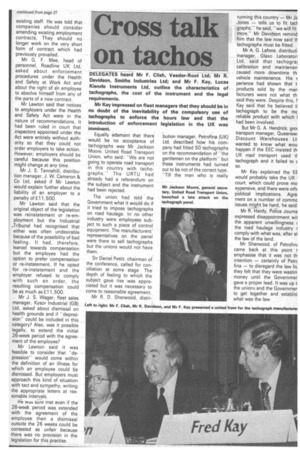ross tai on tachos
Page 30

If you've noticed an error in this article please click here to report it so we can fix it.
DELEGATES heard Mr F. Clish, Veeder-Root Ltd; Mr R. Davidson, Smiths Industries Ltd; and Mr F. Kay, Lucas Kienzle Instruments Ltd, outline the characteristics of tachographs, the cost of the instrument and the legal requirements.
Mr Kay impressed on fleet managers that they should be in no doubt of the inevitability of the compulsory use of tachographs to enforce the hours law and that the introduction of enforcement legislation in the UK was imminent.
Equally adamant that there would be no acceptance of tachographs was Mr Jackson Moore, United Road Transport Union, who said: "We are not going to operate road transport in this country with tachographs." The URTU had already had a referendum on the subject and the instrument had been rejected.
The union had told the Government what it would do if it tried to impose tachographs on road haulage. In no other industry were employees subject to such a piece of control equipment. The manufacturers' representatives on the panel were there to sell tachographs but the unions would not have them. .
Sir Daniel Pettit, chairman of the conference, called for conciliation at some stage. The depth of feeling to which the subject gave rise was appreciated but it was necessary to come to reasonable agreement.
Mr R. D. Sherwood, distri bution manager, Petrofina (UK) Ltd, described how his company had fitted 50 tachographs on the recommendation of "the gentlemen on the platform" but these instruments had turned out to be not of the correct type. "Till the man who is really
running this country — Mr JE Jones — tells us to fit tact graphs-," he said, "we will fit more." Mr Davidson remind him that the law now said tf tachographs must be fitted. .
Mr A. G. Lafone, distributi manager, Glaxo .Laboratori Ltd, said that tachogral calibration and maintenan caused more downtime th vehicle maintenance. His ( perience had shown that t products sold by the mar facturers were not what th said they were. Despite this, r Kay said that he believed tl tachograph to be the mc reliable product with which I had been involved.
But Mr G. A. Hendrick, groi transport manager, Queenswi Discount Warehouses Lt wanted to know what wou happen if the EEC insisted th UK road transport used t1 tachograph and it failed to c so.
Mr Kay explained the EE would probably take the UK • court, which could prove mo expensive, and there were othl political implications. Agre ment on a number of commc issues might be hard, he said Mr R. Hardy, Police Journa expressed disappointment wit the apparent unwillingness ( the road haulage industry 1 comply with what was, after al the law of the land.
Mr Sherwood, of Petrofinicame back at this point t emphasise that it was not th intention — certainly of Petrc fina — to disregard the law bL they felt that they were wastin money until the Governmer gave a proper lead. It was up t the union:-; and the Governmer to get together and establis what was the law.




















































































